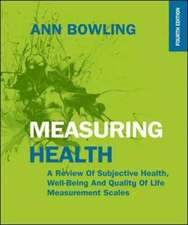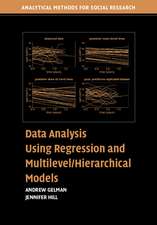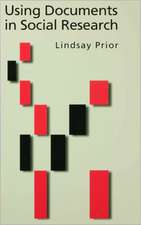A Realist Approach for Qualitative Research
Autor Joseph A. Maxwellen Limba Engleză Paperback – 9 ian 2012
This book will explain how readers can use realism to conceptualize and conduct their qualitative study to get results with greater validity.
Preț: 391.85 lei
Preț vechi: 502.37 lei
-22% Nou
Puncte Express: 588
Preț estimativ în valută:
74.98€ • 78.55$ • 62.14£
74.98€ • 78.55$ • 62.14£
Carte disponibilă
Livrare economică 18 martie-01 aprilie
Livrare express 01-07 martie pentru 24.98 lei
Preluare comenzi: 021 569.72.76
Specificații
ISBN-13: 9780761929239
ISBN-10: 0761929231
Pagini: 240
Dimensiuni: 152 x 229 x 15 mm
Greutate: 0.32 kg
Ediția:1
Editura: SAGE Publications
Colecția Sage Publications, Inc
Locul publicării:Thousand Oaks, United States
ISBN-10: 0761929231
Pagini: 240
Dimensiuni: 152 x 229 x 15 mm
Greutate: 0.32 kg
Ediția:1
Editura: SAGE Publications
Colecția Sage Publications, Inc
Locul publicării:Thousand Oaks, United States
Recenzii
“Maxwell's book is an outstanding accomplishment. He has connected a tremendous amount of past and present knowledge in it. His reading and integration cuts across multiple disciplines. I especially like the discussions of causation, ‘validity’, and the methodological significance of viewing culture as distributed."
“This book is well-written and clearly argued, and does a good job of connecting what are often arcane philosophical issues with the more practical concerns of carrying out qualitative research.”
“The information presented is novel. It serves to advance current epistemological thinking in the area of qualitative research. It is the only book I’m aware of that links issues of epistemology and ontology so directly with qualitative methodologies.”
This timely text could at last get us to the tipping point where realistapproaches enter the mainstream of qualitative research. They have gainedwidespread acceptance by philosophers but continue to be regarded withsuspicion by the dominant tribe of constructivist qualitative researchers. Maxwell provides a convincing case that realism helps to resolve many of theproblems they face without deserting cherished aspects of constructivism.
"This is a book that should be read by qualitative researchers at any stage of their career and by those critical of the qualitative and realist approach to social science, such is the manner in which Maxwell introduces, negotiates and analyses key issues in research methodology."
“This book is well-written and clearly argued, and does a good job of connecting what are often arcane philosophical issues with the more practical concerns of carrying out qualitative research.”
“The information presented is novel. It serves to advance current epistemological thinking in the area of qualitative research. It is the only book I’m aware of that links issues of epistemology and ontology so directly with qualitative methodologies.”
This timely text could at last get us to the tipping point where realistapproaches enter the mainstream of qualitative research. They have gainedwidespread acceptance by philosophers but continue to be regarded withsuspicion by the dominant tribe of constructivist qualitative researchers. Maxwell provides a convincing case that realism helps to resolve many of theproblems they face without deserting cherished aspects of constructivism.
"This is a book that should be read by qualitative researchers at any stage of their career and by those critical of the qualitative and realist approach to social science, such is the manner in which Maxwell introduces, negotiates and analyses key issues in research methodology."
Cuprins
Preface: The Value of Realism for Qualitative Research
Acknowledgments
About the Author
Part I: A Realist Stance for Qualitative Research
Chapter 1: What Is Realism, and Why Should Qualitative Researchers Care?
Chapter 2: Meaning and Culture Are Real
Chapter 3: Causation Is Real
Chapter 4: Diversity Is Real
Part II: Realism and Qualitative Methods
Chapter 5: The Realities of Research Design
Chapter 6: Research Relationships and Data Collection
Chapter 7: Real and Virtual Relationships in Qualitative Data Analysis (with Barbara Miller)
Chapter 8: Understanding, Validity, and Evidence
Part III: Applications of Realism in Qualitative Research
Chapter 9: Explaining Plains Indian Social Organization
Chapter 10: Meaning and Diversity in Inuit Kinship and Culture
Conclusion
References
Author Index
Subject Index
Acknowledgments
About the Author
Part I: A Realist Stance for Qualitative Research
Chapter 1: What Is Realism, and Why Should Qualitative Researchers Care?
Chapter 2: Meaning and Culture Are Real
Chapter 3: Causation Is Real
Chapter 4: Diversity Is Real
Part II: Realism and Qualitative Methods
Chapter 5: The Realities of Research Design
Chapter 6: Research Relationships and Data Collection
Chapter 7: Real and Virtual Relationships in Qualitative Data Analysis (with Barbara Miller)
Chapter 8: Understanding, Validity, and Evidence
Part III: Applications of Realism in Qualitative Research
Chapter 9: Explaining Plains Indian Social Organization
Chapter 10: Meaning and Diversity in Inuit Kinship and Culture
Conclusion
References
Author Index
Subject Index
Notă biografică
Joseph A. Maxwell is a Professor (Emeritus) in the College of Education and Human Development at George Mason University, where he taught courses on qualitative and mixed methods research. He is the author of Qualitative Research Design: An Interactive Approach (3rd ed.; SAGE, 2013), A Realist Approach for Qualitative Research (SAGE, 2012), and papers on qualitative and mixed methods research, program evaluation, sociocultural theory, Native American societies, and medical education. He has a PhD in anthropology from the University of Chicago.
Descriere
Instructs readers on how to use realism to conceptualize and conduct their qualitative study to get results with greater validity.












